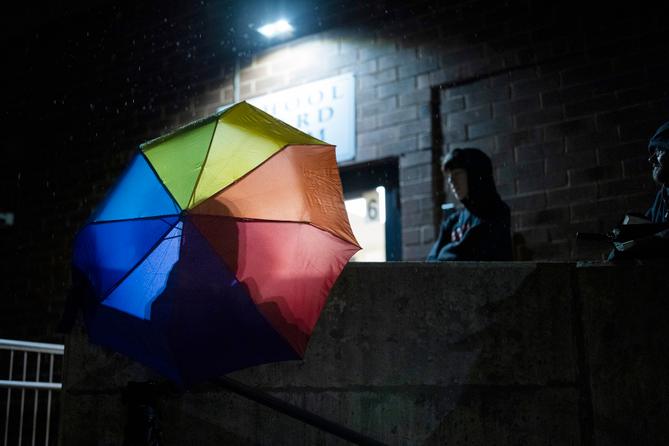This article is made possible through Spotlight PA’s partnership with NOTUS, a nonpartisan news organization that covers government and politics with the fresh eyes of early career journalists and the expertise of veteran reporters.
Central Bucks School District in Pennsylvania was once considered the epicenter of the classroom culture wars. In recent years, it banned books, prohibited pride flags in classrooms, and implemented a gender identification process that required teachers to only use names and pronouns listed in official school databases, even if a student requested otherwise.
But in little-noticed school board elections earlier this month, voters rebuked those decisions by electing four Democrat-endorsed candidates and, in the process, cemented a 9-0 liberal majority on the board. While Democrats previously held the majority, the gains for full control of the board showed a vote of confidence from voters.
Central Bucks, located in a county that elected Republican Rep. Brian Fitzpatrick and won by President Donald Trump in 2024, was part of a larger Democratic sweep of school board elections across the country this November. In states like Kansas, Idaho, Colorado, and Texas, where issues around transgender student athletes and banned books dominated the past few election cycles, some Democrats were able to pull off longshot bids.
Democrats hope to hold onto those gains and reverse policies implemented by conservative-majority school boards over the past five years.
“You’ve never had the wholesale flip of a school board like this, in one of the most conservative areas in central Pennsylvania,” said Malcolm Kenyatta, vice chair at the Democratic National Committee and a Pennsylvania state representative.
“[The results] speak to Democrats’ commitments that our school boards should not be political battlefields,” Kenyatta said. “Winning campaigns are those that focus on answering that question of how we make people’s lives better.”
These results, Kenyatta and other Democrats argue, show voters want to move past ideological questions and focus on issues like affordability even further down the ballot.
Mekkai Williams, who won his bid for a Hempfield school board seat southwest of Central Bucks in Pennsylvania earlier this month, said voters in his district were concerned about the cost of living this election cycle. Williams ran on implementing full-day kindergarten in an area where parents are struggling to pay for childcare.
Williams was endorsed by the DNC and ran in Lancaster County, where President Donald Trump earned 57.5% of the vote in 2024.
“Childcare is extremely expensive now, and it shouldn’t be on the family to have to choose between sending their child to school or trying to figure out how to pay the bills,” Williams said.
Williams added that Hempfield was the first school district in Pennsylvania to require that students play on sports teams aligned with their sex at birth, an issue that Republican-endorsed candidates continued to run on. Voters in Hempsfield were looking for something new, he said.
“The entire Republican slate’s platform was that they were going to protect girls competing in girls sports,” Williams said. “They didn’t talk about supporting students. They didn’t talk about supporting teachers. They didn’t run on a vision like we did.”
Ameshia Cross, the communications director at education advocacy organization EdTrust, said Democrats should continue to capitalize on the attention that culture war issues brought to school board elections to mobilize voters in future races.
“What we have seen over the past few years is a hyper-focused communications and narrative strategy around the importance of school board elections,” Cross said. “We have seen advancements in people locally showing up to these elections who normally would not.”
Still, Republicans from the state said that this year’s school board elections were nothing to worry about. Fitzpatrick, whose district includes Central Bucks, said he was not expecting to see Republican wins.
“This is the cyclical nature of politics,” Fitzpatrick said. “Anytime there’s an overreach, the pendulum swings back in the other direction. That has and always will be the case.”
Pennsylvania Rep. Rob Bresnahan, a Republican, said low turnout in an off-cycle election year affected school board election results across the state. But he added that Republicans need to get on the same page when it comes to future elections.
“Affordability and economic impacts and the kitchen table issues is something that we have been fighting for,” Bresnahan said. “But there needs to be a unified front here with real conversations about affordability.”
The Republican Party of Pennsylvania did not respond to an interview request from NOTUS on school board elections.
But its chair acknowledged in a broader statement immediately after the elections that they were “tough” and “not what we wanted.”
“We will examine what we did right, what we did wrong, and where we can do better. Today is the first day of the 2026 election, and we have work to do,” Chair Greg Rothman said in a statement on Nov. 5.
Some observers said that the results may indicate a crack in how nationalized local races have become in recent years.
Chris Bonneau, a treasurer at Together for PR, which ran a slate of four Democrat-endorsed candidates in the Pine Richland area, located in Blue Allegheny County, said Republicans’ assessment should include a reconsideration of culture war issues and their salience with voters.
While Bonneau said school boards have been hot-button issues for voters since 2020, candidates in his area ran successful campaigns on fiscal responsibility. He expects to see ideological debates in schools settle down over the next few years.
“Maybe things will get back to boring, back to school board meetings being an hour long,” Bonneau said. “Some of this culture war stuff, it’ll settle down a bit and we can get back to these elections that really shouldn’t be partisan.”
Correction: This story has been updated to reflect that President Donald Trump won Bucks County in 2024.
